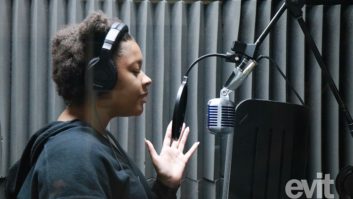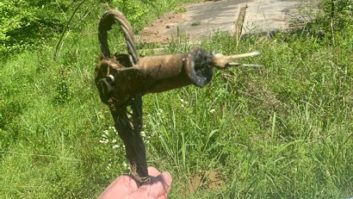Of course you need more trained, ready-to-hit-the-ground-running sales people on your team.
Radio is the number-one mass media in reach and frequency in 2017. As Iowa farmers taught me when I lived in that state, you’ve got to make hay when the sun shines.
I decided to write this article because I learned that when I leave my university after seven years of teaching radio sales classes, both introductory and advanced, these classes will no longer be taught as part of the curriculum.
I find that ironic.
When Matt Bevin was elected Kentucky’s governor, he said higher education needed to provide the skills that Kentucky businesses and industry needed.
In conjunction with the Kentucky Broadcasters Association, I conducted a survey of the state’s 300 radio stations in June 2013, and the number one position stations indicated they needed to fill was that of sales representative.
LACKEY

Flash forward to 2017. I started my research by calling Kentucky Broadcasters Association President/CEO Henry Lackey to see if the 2013 information was still accurate.
I asked Henry how critical the teaching of broadcast sales in colleges was to the future of the radio industry, and he quickly responded: “It is extremely important!”
It’s why KBA invests $30,000 annually into the KBA WKU Radio Talent Institute (of which I was the founding director in 2013). The RTI spends five of the nine days of the institute covering radio sales and conferring Radio Marketing Professional certifications from the Radio Advertising Bureau upon the students.
“I think this program is extremely valuable,” Lackey said.
FARBER

The Radio Advertising Bureau serves the sales arm of the industry. Erica Farber is passionate about generating revenue for radio. When I told her about the future (or lack thereof) of my sales classes, she immediately wondered how widespread this might be across the colleges and universities of America.
Erica plans to conduct a study through the Broadcast Education Association and will be reaching out to its executive director, Heather Birks, who told me “this is TERRIBLY important” to her. (Yes, Heather used all caps on “terribly” in her email to me.)
Erica said she’s very interested in learning what the RAB can do to help broadcast schools increase their focus in this area — one considered a critical need for the radio industry.
LEVY

Before founding sales training company Revenue Development Resources, Mark Levy, CRME, was RAB vice president in charge of sales training.
Today, Mark also runs the National Association of Broadcasters Media Sales Institutes, a 10-day intensive sales training boot camp held after college graduations. Students learn the basics of media sales, including winning sales strategies, networking, creating effective presentations and closing sales. MSI partners with Arizona State University, Florida A&M University, Howard University and Ohio University.
Mark told me that one of the big problems he sees with professors is that they’ve never actually sold radio in their lives. They try to teach sales strategies out of a book. It can’t be done. He said Larry Patrick, founder of Patrick Communications, would invite college educators to do an internship to learn what it’s really like to sell radio advertising.
Mark said colleges need to act like they do when hiring football coaches. They don’t hire Ph.D.s to coach the football team, and teaching radio sales should be about hiring people who’ve done it successfully and can mentor students into winners in sales.
MIMS

Bruce Mims, Ph.D., is co-author of “Keith’s Radio Station” (Ninth Edition) and professor of mass media, Southeast Missouri State University.
Bruce told me as soon as he began teaching full-time in 1989 he was aware of the cry from the radio industry about the need to teach sales. He said his department’s advisory council, state broadcast association and countless others at BEA, CBI and NBS conventions have told him how critical the need is for training in this area.
The sad fact is that none of the faculty has any meaningful background or experience in selling media. This has had a chilling effect on department-level discussions.
The other thing people outside the academy don’t realize is that there are stiff turf battles inside colleges and that business departments try to prevent any other department from teaching any sales classes since they feel that’s their area of expertise.
WARNER

Charles Warner is a blogger at Media Curmudgeon, teacher at The New School at NYU, Forbes columnist and author of “Media Selling” (Fourth Edition). I was introduced to him by my good friend and radio visionary John Parikhal, president/CEO of Joint Communications.
Charles was immensely helpful in helping me to transition from a market manager for iHeartMedia to broadcast professor. I use his textbook in my sales classes. He is beginning work on his fifth edition of this excellent textbook that will include digital sales and programmatic buying.
He suggests that the problem in hiring experienced teachers for teaching sales versus Ph.D.s lies with the accreditation process. In order to satisfy these requirements, it often means hiring terminal degreed faculty, as opposed to those with street smarts.
GRANT

Augie Grant, Ph.D., is president of the Broadcast Education Association and journalism professor at the University of South Carolina.
At USC, Augie said they hire two kinds of faculty: Ph.D.s for research and teaching duties; and journeyed faculty with master’s degrees, who have real-life learning versus book learning to do the skills training part of their program.
ALBARRAN

Al Albarran, Ph.D., author and former chair of the department of media arts at the University of North Texas, told me that he hired Lee Salzberger when the latter retired from BELO Broadcasting to be an adjunct professor at the University of North Texas for 10 years.
When Lee retired from teaching at UNT, no one could be found to teach the classes for the next two to three years. Then when Albarran stepped down as department chair, a new chair moved the program in the direction of film (this appears to be occurring at my university with the change in leadership as well).
CONNELLY

Don Connelly, CRME, is professor and department head, department of communications, Western Carolina University. He is a career radio guy with a master’s degree — like me. He is the head of his department, and his university offers a concentration in broadcast sales. He personally brings 23 years of professional radio experience to his school.
He partners with the RAB to offer the RMP certification to his students. He estimates that there may be only 10 institutions of higher education that offer such a media sales intensive program as Western Carolina does. He also said that it’s a challenge hiring experienced faculty, those whose years in the industry have taught them all they know, as opposed to those who learned from a book.
WHAT HAVE I LEARNED?
What I learned is that the academy has a snobbery that prevents it from hiring the people needed to teach the classes that the radio industry wants to be taught. Until this changes, don’t expect more colleges and universities to teach in this area, despite the industry’s critical need.
Let me share my experience in seven years of university teaching.
Degrees and publishing in academic journals is valued over real on-the-job experience and publishing in trade publications (like Radio World) or blogs that are widely read (DickTaylorBlog.com now has more than 75,000 readers all over the world).
Radio keeps the exciting career of sales a deep dark secret. Students who have taken my introductory broadcast sales class discover a career they never knew existed. I’ve had students who came to the university to be a TV anchor or reporter or disc jockey who have had the light bulb go off in their head and switch to media sales. These students also have been the ones who graduated with a job waiting for them.
Madison Ogg is a senior at Western Kentucky University and wrote, “Dick Taylor was my broadcasting sales professor and I can truly say he taught me everything I know about the power of selling. I had no intent to study sales before I came to WKU, but with his vast knowledge, experience and passion he shows for sales, Mr. Taylor was able to help me find the career path I’m pursuing now.”
The radio industry needs sales talent. It’s already out there and would love to be a part of our industry.
But if they never get a chance to know what we offer, they will go into other careers — and that will be radio’s loss.
Dick Taylor is a Certified Radio & Digital Marketing Consultant and assistant professor of broadcasting at Western Kentucky University in Bowling Green, Ky. He joined the faculty of its School of Journalism and Broadcasting after a 42-year career in radio. He is director of the KBA WKU Radio Talent Institute and is on the board of the New Jersey Broadcasters Association.







